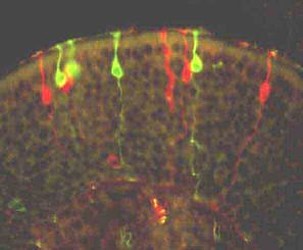Research topics
The major topics of our research group are molecular mechanisms and functional implications of chemoreception. The main chemosensory systems, olfaction and gustation, have an enormous capacity to recognize and discriminate myriads of extraneous molecules and to convert these chemical signals into electrical impulses which are conveyed to the brain for perception of odors and taste. Chemosensation is of fundamental importance not only for food finding and assessment, but also in recognition of territories as well as partners and predators. The function of chemosensory cells based on the interaction of cellular receptor proteins with extraneous compounds is fundamental for the sensory process. We are studying these aspects on odorant receptors as well as on receptors for pheromones. Furthermore, the responsiveness of chemosensory cells can be modulated by endocrine signals, most noteably be hormones regulating food intakes.
Our projects on chemosensory cells in the gastrointestinal mucosa unravel the potentially central role of these cells in regulating the basic processes of the intestinal system. Several complex effects of food ingredients on gastrointestinal activities appear to be mediated via the chemosensory cells.
Scientific focus:
- Sense of smell
- Gastrointestinal tract
- Insect pheromones

